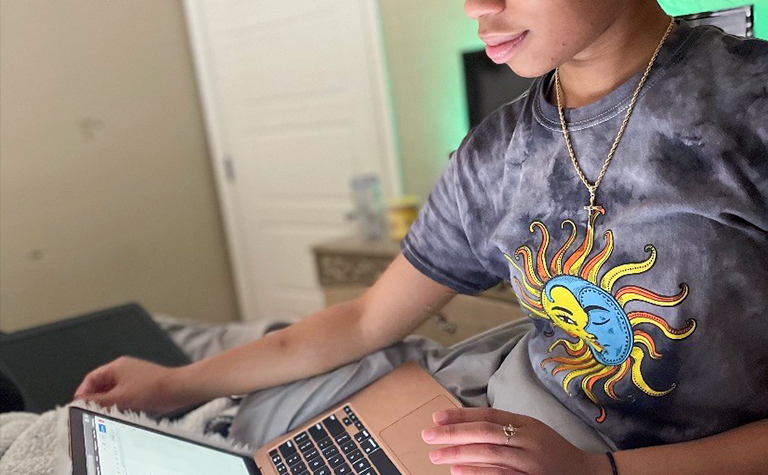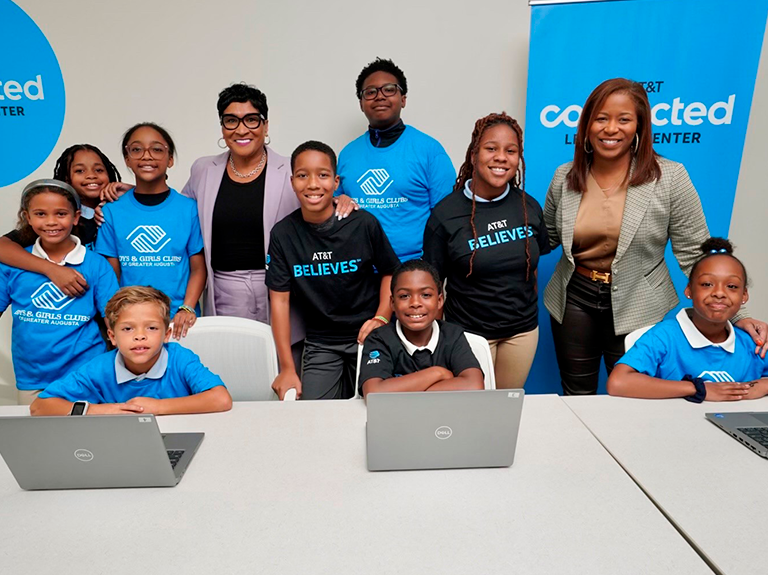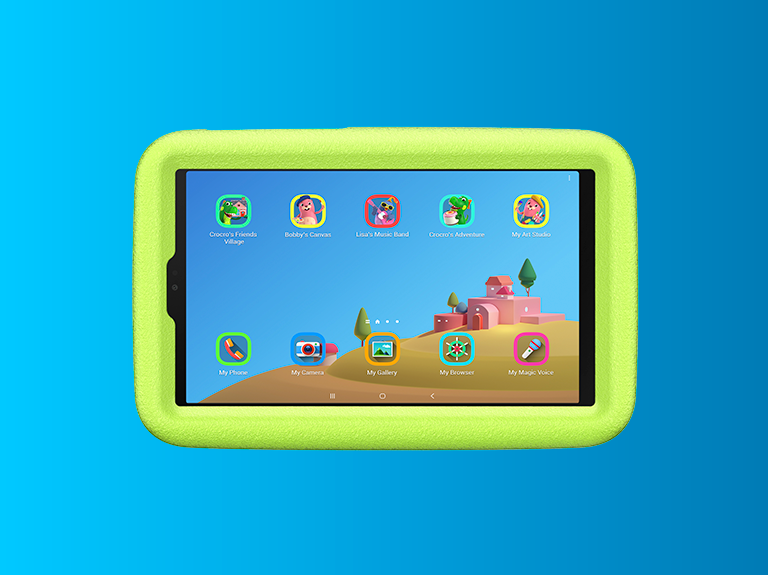How AT&T is Helping At-Risk Students Stay Connected to Online Learning
“Our kids were left behind. Many didn’t have internet or devices and could not perform basic computer tasks”
Educators and leaders share real life impacts of the homework gap
In March 2020, schools across America shifted to distance learning due to the global pandemic. Crystal Eldringhoff, a teacher at Cristo Rey Baton Rouge Franciscan High School, noticed an immediate problem. Students had difficulties with logging in, screensharing, bandwidth and internet speed. Frustrations began to compound. “When you have students miss class because of internet issues, it makes everything so much more complicated. They fall behind.”
This is just one example of some of the frustrations that many students, families and teachers experienced for more eighteen months and in many cases these frustrations will continue during the 2021-22 academic year as schools increasingly rely on digital resources to help their students advance. Having quality internet connectivity and technology is vital for students to succeed no matter where they learn. To help, AT&T teamed up with leading nonprofit Connected Nation to provide at risk students from more than 100 organizations and schools across the country with free wireless hotspots as well as wireless data and content filtering services.
Now, 35,000 devices have been delivered to some of our nation’s most vulnerable students across the country. Here, leaders and educators share more about their experiences helping students continue learning during the pandemic.
Detroit Achievement Academy – Detroit, MI
Remote learning is often a challenge for students who don’t have access to reliable internet and devices – and at the height of the pandemic, lack of connectivity became a major roadblock for those attending Detroit Achievement Academy, a free public charter school serving students in Detroit, MI. As kids shifted to virtual school last year, under connected students and parents became frustrated with slow or unreliable internet that caused many learners to fall behind. To support the students of Detroit Achievement Academy, Connected Nation provided the school with Wi-Fi enabled hotspots and more than a year of AT&T internet, allowing formerly disconnected students to access distance learning resources at home.
Alexa Kraft O’Brien, Chief Operating Officer at Detroit Achievement Academy, observed the impact these devices had on students’ ability to thrive. “The addition of that seamless internet connection was kind of the last piece that we needed to get through to even more of our families and students who had not been able to engage with us in that way,” said O’Brien. Parents noticed a difference, too, as the enhanced connectivity allowed households to juggle priorities among family members with competing school and work responsibilities. With the help of reliable internet, Detroit Achievement Academy was able to stem learning loss for so many students at risk of falling victim to the homework gap.
Roots and Wings – Delray Beach, FL
A former elementary school teacher, Ted Hoskinson founded Roots and Wings to serve kids and families in need – a mission originally developed by him and his wife, Anne. After Anne’s unexpected passing in 2016, Ted established the organization in her honor and began its work of providing after-school support for second and third grade students at risk of failing their Florida Standard Assessment in reading. This work became more difficult as the COVID-19 pandemic magnified our country’s digital divide in the spring of 2020. “Students were dramatically affected,” said Hoskinson, as many kids did not initially receive sufficient technology to complete their schoolwork. “This problem was compounded by the fact that internet connectivity was not easily accessible in many underserved communities.”
In December around the 2020-21 season tip off, AT&T and the NBA created a retweet for good campaign that donated an additional $100k to Connected Nation to help close the homework gap. Thanks to those efforts, Roots and Wings received 240 hotspots, 120 personal learning devices and internet service to give extra resources to children who may need more support to advance their learning. AT&T and the NBA told students at Orchard View and Pine Grove Elementary schools – Roots and Wings’ supported schools – in a special way. They called Bam Adebayo, a Miami Heat player with a passion for education, to surprise the students by virtually dropping into their classrooms. Hoskinson described the moment as “pure excitement” for the kids. Aside from delivering the tremendous news, Bam also offered words of encouragement, mentioning how many hours he practices each day, even in the offseason, “Children need to know that to be a success one must work hard. It starts by showing up.”
Southeast Community Development Corporation – Los Angeles, CA
Southeast Community Development Corporation (SCDC) faced the worsening effects of the digital divide for years. The nonprofit works with vulnerable students in Los Angeles County. Many of their students struggled to afford internet even before the pandemic. As kids became increasingly disconnected over the course of the pandemic, the organization grappled with how to engage children. “Our kids were left behind. Many didn’t have internet or devices and could not perform basic computer tasks,” shared Executive Director Emma Hernandez. Those with devices encountered unique challenges, too, including unstable hotspots, slow connections and not enough bandwidth for the number of children participating in virtual learning in one household.
Connected Nation sent them 500 AT&T hotspots and free AT&T internet connectivity for students to use for online learning opportunities both over the summer and into this school year. SCDC is also doing everything it can to keep kids technologically savvy long-term. “We provide students with STEM programing so they can learn the basics of digital literacy for their generation, like coding, understanding what’s behind an app, how electronics get programmed and more.”
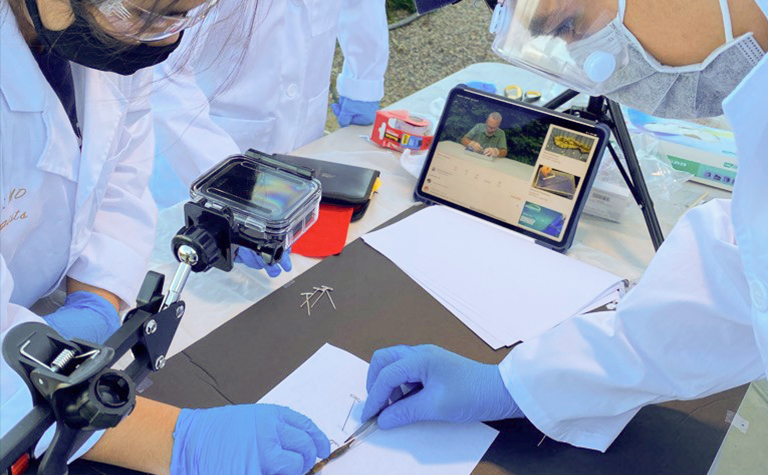
Hmong American Peace Academy – Milwaukee, WI
Hmong American Peace Academy (HAPA) was established as a charter school of Milwaukee Public Schools to help students become knowledgeable American citizens while preserving the Hmong culture and language. The school is attended primarily by Asian students who live at or below the poverty line, several of whom come from refugee families. “Internet can be expensive for our families, and with the language barrier, it was particularly hard to set up new devices and service,” said Luke McAvoy, Director of Operations.
With 500 AT&T hotspots and free AT&T internet connectivity that were provided by Connected Nation, kids now have the tools they need to succeed. McAvoy has described parent engagement as “through the roof” since implementing the new technology – a testament to what can be accomplished between families and educators when digital barriers are removed. The devices also came in handy during the Academy's summer school program, as internet access kept kids on track through a self-paced model that allowed students to move forward at their own comfortability.
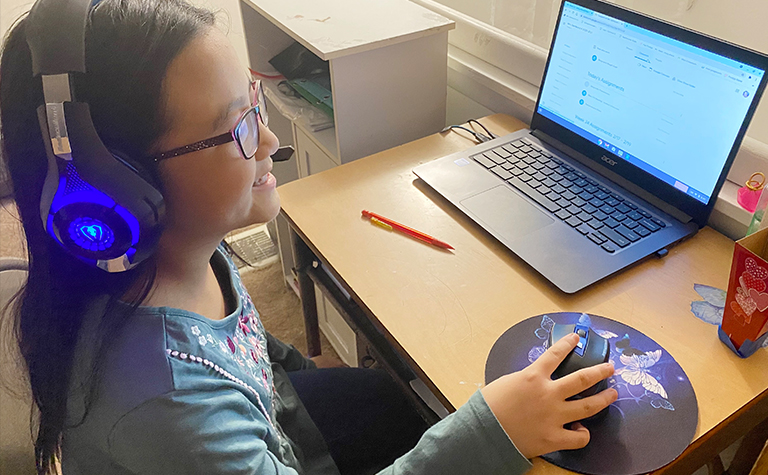
Cristo Rey Baton Rouge Franciscan High School – Baton Rouge, LA
Cristo Rey Baton Rouge Franciscan High School, whose student population is 100% low income, transitioned to virtual learning in March 2020. Teacher Cecile Morgan struggled to communicate with students who did not have proper internet access. Though educators provided hard copies of educational materials to hard-to-reach families, these kids remained at a “horrible disadvantage,” said Morgan.
President Eric Engemann noticed a difference after receiving 50 AT&T hotspots and free AT&T internet connectivity that were provided by Connected Nation. “Hotspots help with mobility. Sometimes kids are in two different households and don’t have internet at both places. Being able to do work on-the-go is useful.”
In fact, several teachers report that online learning technology can be beneficial. “This technology is here to stay. There are a lot of things that the pandemic has forced us into that are actually good,” said Morgan. “We were already competing against technology because kids would go home every day and play games. But now we’re using it to teach, and the fact that students are using technology in an educational setting gets them more involved.”
Our collaboration with Connected Nation is just one way we’re working to close the digital divide and narrow the homework gap. In April 2021, we announced the AT&T Connected Learning program, which is part of our companywide $2 billion, 3-year commitment to bridge the digital divide. The program aims to help stem learning loss, narrow the homework gap, and deliver high quality learning experiences anywhere today’s connected students learn.
